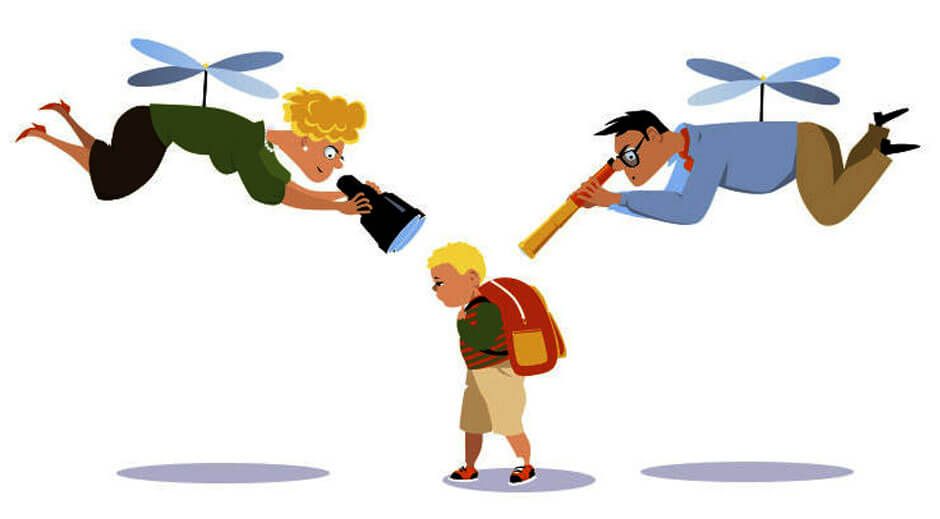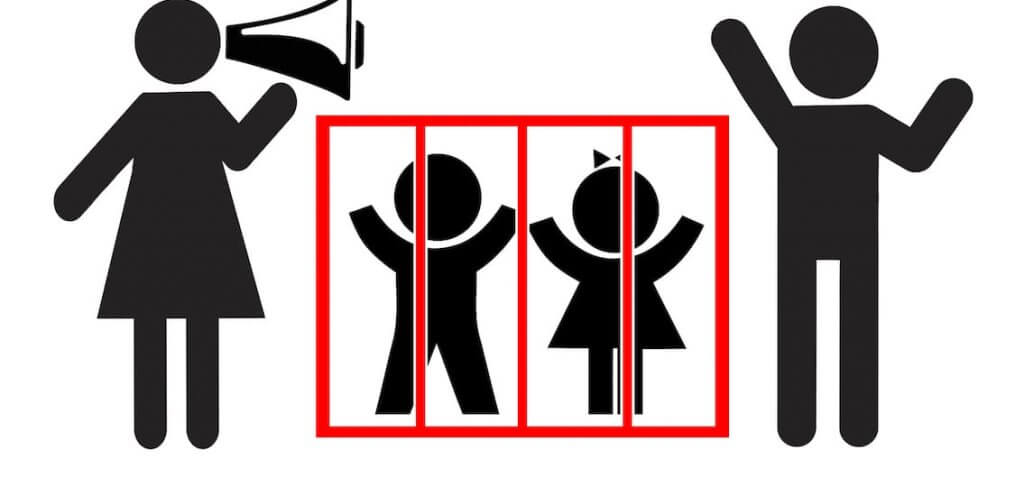Helicopter parenting: Harmful or beneficial for kids?

Introduction:
Yet again Jay’s mom didn’t allow him to go for a school trip. Ouch! Again, Jay was disappointed. Tears. Heartbreak. Anger. Sad too. Why this repeated story? Jay’s mom didn’t’ allow him to go for the school trips ever or she frequently met his schoolteacher, why was it so?
What made her do his homework? She is following Jay’s activity all the time. Calling him at least 4-5 times a day, sometimes disturbing him in a class too. Her involvement with Jay’s every activity was little too much. Jay was disturbed with this. Was Jay’s mother a helicopter parent?
I know, you must be mirroring it with the recent film Helicopter Eela. Yes, it focuses on the same issue.
What is Helicopter parenting?
Helicopter parenting is a style of parenting where parents follow and guide their children all the time. They interfere in their children’s lives more than necessary.
Such parents deprive their children of ‘learning something new through experiences’. The kids are all the time thinking about will this meet my parent’s approval? If not, forget about it. They know they will not be involved.
Ah haa! I know what you are thinking. You are thinking, you are NOT a helicopter parent. Well, well, well. Most helicopter parents DENY they are helicopter parents because they DO NOT REALIZE they are one.
10 Signs that show you are a helicopter parent:

1. Excessive involvement in studies:
Helicopter parents show excessive involvement in their child’s study. Sometimes they do their kid’s homework to make sure that it is complete.
2. Not allowing the child to go for trips:
That is simply because you can’t hover on the children when they are out. This fear doesn’t allow them to agree to let children go for the trips. Of course, they are afraid of the child’s safety too.
3. Meeting teachers frequently:
Helicopter parents want to be there every time. So, they frequently visit the school, sometimes gossip and doubt their teaching methods. During the meeting, such parents become the voice of their kid. They will answer questions asked to their children.
4. Not letting children solve their own problems:
Every parent gets worried when their children face any kind of problem. But do you help them solve it or you solve problems on their behalf? Helicopter parents, solve the problems of their children even though they can solve it by themselves.
5. Getting involved in their child’s fights:
For E.g. Jay had a fight at the school with his friend. Instead of giving him a solution and empathizing him first, Jay’s mom immediately called his friend’s mom to complain.
6. Covering up mistakes of children:
Not letting your children realize their mistakes is a sign of helicopter parenting. Such parents try to cover their children’s mistake. Children fail to learn from their mistakes and become arrogant.
7. Keep a close eye on children:
Helicopter parents hover on the children and keep inspecting what they are watching, reading or doing. Child’s concentration is distracted because of continuous interference. Parents also check the browsing history on the computers to know what children are doing.
8. Calling or messaging children frequently:
Helicopter parents, call their children too frequently to check on where they are or what they are doing? I remember my mom calling me at least 4 to 5 times every day during my 20 minutes of travel from a college to home. That explains it all.
9. Not involving them in daily chores:
Doing almost everything for children at home is another sign. These parents do even the kind of work that children should do for themselves. For Ex. keeping their shoes on a shoe rack. Parents, mostly mother will do this for her child rather than developing a discipline.
10. The child calls for help all the time:
Children of helicopter parents need a helping hand in everything they do. Because they know that parents will respond immediately and their work will be done at ease. This toxic style of parenting has a serious impact on the growth of children.
Why helicopter parenting is harmful?
1. Low self-esteem among children:
Children’s ability to solve their own problem is questioned if parents are too much involved in every activity. Kids start believing that they cannot complete the task on their own and hence when they grow, they fail to take initiatives. Guidance and hand-holding are always demanded by these children. Ultimately they grow up with super low self-esteem. The kids may have dreams but they will not live up to their potentials.
2. Their emotional quotient is affected:
The problem-solving capacity of children with helicopter parents is low because their parents are always there to solve the issues on the children’s behalf.
Nowadays, companies demand employees with higher intelligent quotient as well as the emotional quotient. Children with low problem-solving ability scores low on emotional quotient scale. It will adversely affect the career growth of the child.
3. Scheduling & decision-making capacity is low:
Helicopter parents have the habit of planning a day for their children. Hence, when they grow up, they lack this capacity of scheduling their own day. In any kind of work, planning is the key. Lack of this quality can hold the child back from having a successful career.
4. Fear of failure is stronger:
Helicopter parents want their child to score better and hence they complete their homework too. So, they are not confident enough in exams and their fear of failure is higher. Their constant need for approval from the parents weakens their self-confidence which elevates the fear of failure.
5. Lack of decision making:
Since parents have been taking decisions for their children, the decision-making capacity of the children diminishes. They fail to take decisions for themselves. Their trust in their decision making power is in doubt. Such children will constantly search for approval on their actions and that may cause frustration further.
6. May lack problem-solving skills:
Kids of all ages need problem-solving skills. Whether you have a 5-year-old who needs to learn how to write words or a 25-year-old who can’t find a job, kids need to know how they should resolve their problem. You can help them to a certain extent but to hover is wrong. Hovering parents, however, intervene at the first block when the trouble starts, hence kids don’t realize the importance of problem-solving skills.
7. Kids don’t learn to advocate for themselves:
Helicopter parents usually advocate for their children, rather than teaching their children to advocate for themselves.
It’s important for kids to be able to ask questions, gain clarification and speak up when they need something. In the workforce, these kids won’t have mommy and daddy available to help them deal with a mean boss or challenging project at work.
8. Acts as an obstacle to the parent-child relationship:
The actions of a helicopter parent may interfere with the parent and child relationship as well. Constantly nagging your child to get his homework done, or checking up on his every move, isn’t likely to make your child want to talk to you more. Instead, it will push your child away.
Positive benefits of helicopter parenting:
Helicopter parents of younger kids and teenagers are likely to know where their kids are at all times, which is an important safety consideration. They are also likely to be very aware of who their child is with and how their child is doing in school.
1. Your child feels supported:
Having you close contact can give your son a sense of security. This sense of security acts as an enabler for children to branch out and try new things. This feeling will help in boosting his confidence without fearing about the failure. He will be assured that you are there for him and will be always there for them to turn to.
2. Your child will be exposed to a larger variety of activities:
Children when on their own might not seek out new or different activities on their own. They tend to direct towards specific hobbies, interests, or activities that will help them to excel. Having parents who push them to try a variety of new things, such as languages, instruments, sports, etc., helps children develop different skills and determine their interests and affinities. Children who participate in an array of activities are more likely to know the taste of failure.
Not being the best at something helps kids to become more resilient reducing the ideas of perfectionism.
3. Your child will be more likely to succeed:
Chances are that if you are helicopter parenting, you are pushing your children to succeed. You dedicate time to helping them with extra-curricular; you instill in them the importance of practice, time, and effort.
This technique not only benefits your child at the moment but also gives them life skills and lessons for later on down the road.
How to maintain a balance between being a helicopter and a narrow parent:
You may be a closet helicopter parent. Most of the time, this tendency is born out of fear, anxiety, or misplaced guilt. But the problem is that how helicopter parenting can rob the kids to become independent themselves.
So if you’re struggling to reform your helicopter parenting ways, begin to put the following practices into action:
1. Stop taking responsibility for your kids’ actions:
That subconscious impulse to excuse your kids’ actions because “we parents” didn’t remember to remind them is one of the primary reasons for developing parents to helicopter parents.
Let’s stop that altogether. Remember, too, that our kids pick up on that hesitation and self-doubt, and it only serves to make them think it really is our fault.
2. Remind them only once:
No one likes a nag, and no one likes being a nag. So give a single reminder when you must, and then step back and let your kids rise to the occasion.
3. Let your kids fail:
We often feel like our kids’ performance is somehow connected to our parenting skills. If they fail, you fail. But that’s not the truth. Our kids learn from failing, a whole heck-of-a-lot more than they do from being rescued.
Certainly, there are times when an occasional save is needed and appreciated, but it shouldn’t become an everyday occurrence.
4. It’s good to leave your kid on their own sometimes:
Just because you can easily fix something doesn’t mean you have to keep repeating the pattern. For e.g. when your kid forgets his lunchbox or, homework stop mending his mistake. The consequences he’ll face will probably be small, but it will leave a lasting impression, and likely help cure his forgetfulness.
5. Let them learn from their own experiences:
We have to let them learn some things for themselves. That doesn’t mean we’re not going to be there to walk alongside them. It just means that we have to let them learn some lessons first-hand, even if it’s uncomfortable for them and us.
6. Focus on equipping your kids with the skills they need:
You’re not in a class with your kids all day long. You’re not there on the school bus. You can’t possibly be responsible for everything your kids do.
Instead, you have to trust that you have equipped them with the right skills to do their job. When you see that they’re struggling, step in and help them gain the skill they’re missing. So instead of running their lunch box over to the school, teach them how to make a calendar to keep by the front door that lists that they’ll need when going to the school.
7. Don’t do for your kids what they can do for themselves:
Parents have to remember that kids are enough capable to handle their own stuff. Think back to that look of pride on when, as toddlers, they did something for themselves for the first time. Letting them do for themselves what they’re really capable of doing for e.g. making their own lunches or cleaning their own rooms etc. It is an opportunity to keep on giving them that “I’m so proud of myself” experience.
Closing thoughts:
Finally, remember that this is a process. We’re not going to get it right every time. What counts, though, is that we’re making progress and focusing more on what prepares our kids for adulthood than on what alienates our anxiety at the moment. Understand the cons of this parenting style and make the necessary changes to my dear parent.
Happy parenting to You!




